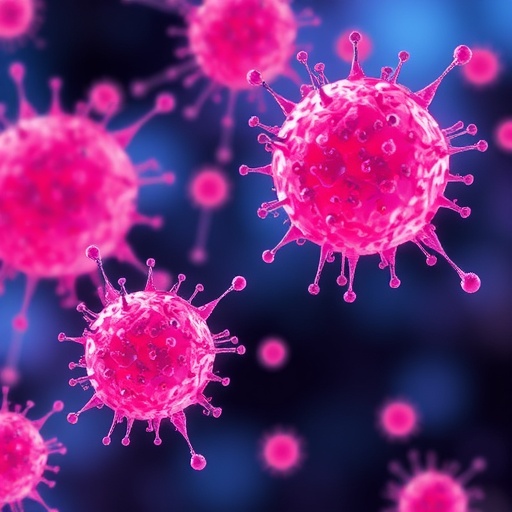
The ongoing exploration into the effects of COVID-19 on different demographics continues to yield critical insights, particularly concerning older adults, who are notably vulnerable to the severe manifestations of the virus and its long-term consequences. The recent study conducted by Cataneo-Piña et al. delves deeper into the intricate interplay of immune responses, specifically Th1 and Th2 regulation, to elucidate how these mechanisms contribute to functional resilience in older adults recovering from severe COVID-19. This research offers a comprehensive perspective on immunological adaptations and resilience in a demographic that is often overlooked in the broader discourse surrounding COVID-19.
Th1 and Th2 cells are subsets of T-helper cells that play a pivotal role in orchestrating immune responses. Th1 cells promote responses that are crucial for battling intracellular pathogens, including viruses. In contrast, Th2 cells are primarily involved in defending against extracellular organisms and are known to mediate allergic responses. The balance between these two immune responses, Th1/Th2 regulation, becomes crucial, particularly in the context of resolving infections and maintaining overall health, especially in older adults who may have pre-existing health conditions that complicate recovery.
The study analyzed immune markers in a cohort of older adults recovering from severe COVID-19, aiming to identify the factors that contribute to improved functional outcomes. Researchers employed advanced immunological assays to measure the levels of specific cytokines and immune mediators indicative of Th1 and Th2 activity. The findings revealed a notable correlation between heightened Th1 responses and improved functional resilience in older patients, suggesting that augmenting this response could be key to enhancing recovery outcomes.
Additionally, the research emphasizes the importance of functional resilience in older adults, highlighting the concept that resilience is not just about surviving an illness but thriving post-recovery. This involves the ability to regain independence, maintain cognitive function, and continue engaging in daily activities. Understanding the immunological mechanisms that underpin this resilience may inform clinical strategies to bolster recovery and improve the quality of life for older adult patients who have faced severe health challenges.
The implications of these findings extend beyond the immediate context of COVID-19 recovery, suggesting that interventions aimed at modulating the Th1/Th2 balance could benefit older adults facing other infectious diseases or health crises. The study advocates for a tailored approach in managing the health of older populations, taking into account the complex interactions of immune responses and their impact on overall well-being.
Longitudinal data were collected that revealed how older adults’ immune systems responded over time following severe respiratory illness. This perspective is critical, as it elucidates the dynamic nature of the immune response and the potential for recovery to be influenced by factors such as pre-existing health conditions, vaccination status, and even lifestyle choices. This data-driven approach enables health professionals to better predict outcomes and assess recovery trajectories in older patients.
Moreover, the study reinforces the concept of personalized medicine, underscoring the need for health interventions to be specifically designed for the demographic in question. Recognizing that older adults are not just one homogeneous group but rather have diverse health profiles is essential for improving therapeutic strategies and developing targeted interventions. This understanding could lead to the design of specific pharmacological or lifestyle interventions aimed at bolstering Th1 responses in susceptible populations.
Furthermore, the research reveals a critical gap in current clinical practices regarding post-COVID care for older adults. Standard recovery protocols may not adequately address the complexities of the immune response and its influence on functional recovery. Integrating immunological assessments as part of routine post-COVID evaluations could significantly enhance the quality of care older adults receive, ultimately improving their recovery rates and life quality.
In examining the broader societal implications of this research, one cannot overlook the continued advocacy for prioritizing older adults in public health discourse. As countries navigate through ongoing waves of viral infections and grapple with the repercussions of long COVID, ensuring the health and well-being of older populations is paramount. Targeted research efforts, such as those by Cataneo-Piña and colleagues, lay the groundwork for creating effective interventions that are both responsive and reflective of older adults’ unique health needs.
The commitment to understanding the implications of severe COVID-19 in older adults catalyzes further research and dialogue around aging and immunology. Each study contributes to a larger narrative that seeks to empower both healthcare providers and older patients alike, fostering informed decision-making and proactive health management. With every new discovery, the scientific community takes one step closer to developing a holistic approach to health care that respects the intricacies of the aging process.
In conclusion, the insights gleaned from studying Th1/Th2 immune regulation and functional resilience in older adults recovering from severe COVID-19 not only enrich our understanding of immunology but also pave the way for improved clinical practices. The findings advocate for a tailored approach that recognizes the significant interplay between immune response and functional outcomes. In a world still grappling with the implications of the COVID-19 pandemic, this research serves as a vital stepping stone towards enhancing the resilience and quality of life of older adults.
As we look to the future, the potential for advancing therapeutic strategies that bolster immune function in older demographics holds promise. There is an urgent need to catalyze further investigations that prioritize older patients, whose experiences and health trajectories warrant heightened attention. Scientific exploration must continue to evolve, especially within the realm of infectious diseases, to ensure the resilience of our aging population is not just a hope but a well-supported reality.
Subject of Research: Th1/Th2 immune regulation and functional resilience in older adults following severe COVID-19.
Article Title: Th1/Th2 immune regulation and functional resilience in older adults following severe COVID-19: a prospective cohort study.
Article References:
Cataneo-Piña, D., Chávez-Galán, L., Ocaña-Guzmán, R. et al. Th1/Th2 immune regulation and functional resilience in older adults following severe COVID-19: a prospective cohort study.
Eur Geriatr Med (2025). https://doi.org/10.1007/s41999-025-01293-x
Image Credits: AI Generated
DOI: https://doi.org/10.1007/s41999-025-01293-x
Keywords: COVID-19, older adults, immune response, Th1, Th2, functional resilience, severe illness recovery.
Tags: COVID-19 recovery in elderlyeffects of COVID-19 on immune systemimmune markers in elderly COVID patientsimmune response in older adultsimmune system balance in older individualsimmunological adaptations in aginglong-term consequences of COVID-19resilience in older adults post-COVIDT-helper cell function in agingTh1 and Th2 regulationunderstanding COVID-19 in elderly populationsvulnerability of older adults to COVID-19




